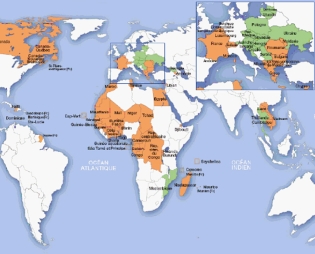On Thursday 4 February 2021, on the occasion of the official creation of SKA Observatory (SKAO), an intergovernmental organisation that will ensure the construction and subsequent operation of the Square Kilometer Array (SKA), the largest research instrument in radio astronomy for decades to come, France announced its wish to join the project.

For this, two antenna networks will be installed, one in Australia, the other in South Africa. The deployment of these two networks in the southern hemisphere should make it possible to explore the unknown at a capacity never reached before.
The project also promises to be a technological achievement: the flow of data generated is expected to exceed today’s global internet traffic and Facebook’s current storage needs each year. For the first time, supercomputers for processing data will become an integral part of telescopes, like antennas, making SKA the first “Big Data” observatory.
The international organisation SKAO was officially created on Thursday, February 4, 2021. On this occasion, France announced its wish to contribute to this landmark project. Currently an observer country on the Council of the SKAO organization, France has initiated the membership application process in order to join South Africa, Australia, China, Italy, the Netherlands, Portugal and the United Kingdom who have already signed the SKAO International Convention.
The French community wishing to contribute to the SKA project has joined together in the “Maison SKA-France” which brings together seven public institutions (CNRS, Observatoire de Paris, Observatoire de la Côte d’Azur, University of Bordeaux and University of Orleans, INRIA , CEA) and seven companies (Air Liquide, ATOSBull, Callisto, CNIM, FEDD, Kalray, Thalès).
The National Center for Scientific Research, which identified SKA as a priority, estimates that after the instrument is commissioned, the French scientific community involved in its operation should exceed 400 researchers in the fields of astrophysics, cosmology and fundamental physics, with which scientists from other fields will be connected on digital, technological, methodological and societal research issues.







Problem displaying Facebook posts.
Click to show error
Follow